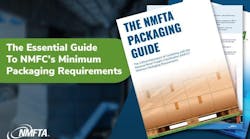An audit of the Federal Motor Carrier Safety Administration's Safe Stat system has put the agency's database of commercial vehicle crashes, the Motor Carrier Management Information System (MCMIS), under intense scrutiny.
Although the report by the Oak Ridge National Laboratory (ORNL) was completed over a year ago, it was made publicly available only recently.
ORNL reported that untimely and incomplete data continue to keep SafeStat, the MCMIS carrier safety rating system, unreliable.
Although the report was completed in October 2004, it was made available to the public just recently.
“Incomplete [MCMIS] data resulted in some carriers being ranked “at risk” when they would not have been with complete data,” according to the report.
Under-reporting to MCMIS was estimated at about 33%. ORNL noted that states reported crash information anywhere from 13 to 339 days after the incident took place, and concluded that these variances are enough to break the SafeStat system.
“Selecting carriers with the highest [SafeStat] scores, without addressing the accuracy of the scores, results in the selection of many carriers due to random variations and not true change in carrier risk,” the report stated.
“[The ORNL report] calls into question the underlying algorithm of SafeStat,” David Osiecki, vp-safety for the American Trucking Assns. (ATA) told Fleet Owner. “It calls into question its validity.” Osiecki also pointed out that if DOT plans to continue using SafeStat, it must find ways to increase the objectivity and accuracy of the rating system.
“The agency has criteria and guidelines they provide to states on what could be a reportable truck crash, but it's complex,” Sharon Silas, GAO project director, told Fleet Owner. “It's hard to make sure everyone is reporting it the same way. FMCSA can do the training and provide funds, but they can't … force the states to report a certain way.”
Bob Inderbitzen, director of safety & compliance for the National Private Truck Council, thinks the government is not doing enough to improve reporting. “It's beyond me why this problem is being allowed to exist,” Inderbitzen told FLEET OWNER. “[The government is] not trying to use a heavy hand with the states and is instead giving them money and time to fix the problem.”


